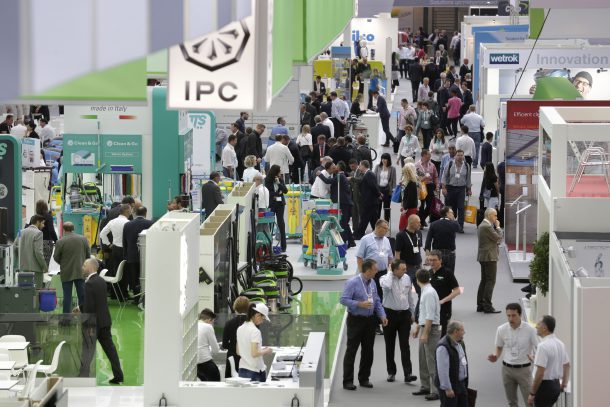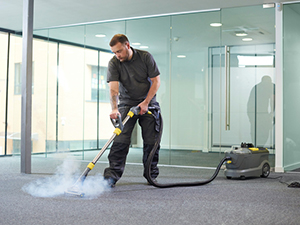
At a time when building service contractors and cleaning companies are operating in highly competitive markets, an internationally respected certification promises to be a game changer for cleaning and hygiene standards in Australia.
For cleaning industry leader Matt Marsh, the key to the ongoing success of his business is to insist on “continuous improvement”. The managing director of Sebastian Group believes measures such as adopting new technology and software, finetuning processes and pursuing higher standards of cleanliness are imperative.
This explains why the group has become the first Australian business to complete the Cleaning Industry Management Standard (CIMS) Advanced by GBAC certification.
While Marsh and his team had previously achieved other CIMS certifications, they wanted to complete the latest standard, which includes advice from the Global Biorisk Advisory Council (GBAC) a division of ISSA, to promote better health, hygiene, and safety standards.
“The driver for us is that CIMS gives us the necessary guidelines to better operate our business,” Marsh says.
“It’s made us review our organisational structure and it helps us reset and rebuild our business.” He adds that, unlike some other “regimented” standards, CIMS can be customised to fit different operations regardless of their size and target market.
Explaining CIMS
ISSA Oceania manager Lauren Micallef says the broader CIMS certification is a valuable management and operations standard because it caters for how building service contractors, facilities, and in-house cleaning organisations operate.
A large part of that relates to the Standard being developed through a consensus standard development process, which brought together volunteers representing varied viewpoints and interests.
ISSA is committed to helping Australian businesses follow the lead of Sebastian Group and achieve the CIMS Advanced by GBAC certification, which has been widely adopted Internationally.
Micallef notes that it is the first consensus-based management standard that outlines the primary characteristics of a successful, quality cleaning organisation, including disinfection and infection-prevention protocols.
As such, it demonstrates that organisations are dedicated to a higher standard of cleanliness, which is crucial given today’s environment.
“This certification has been developed by the cleaning industry for the cleaning industry,” she says. “So, they’re people who understand how the industry works and the demands on both sides when negotiating cleaning contracts. It also ensures from a facility point of view that you’re able to work with credible organisations.”
Perhaps most significantly, Micallef says the CIMS Advanced by GBAC certification is a tool that helps cleaning businesses go to the next level as they improve business practices and systems, standardise processes and educate and empower staff. It also helps cleaning organisations to thoroughly understand a customer’s service requirements.
The CIMS program uses third-party accredited assessors in the field to investigate, analyse and determine if applying cleaning organisations are compliant with CIMS protocols and requirements.
Stuart Nicol, chairman of ISSA’s Oceania Advisory Council, hopes that the rollout of CIMS Advanced by GBAC will lead to a scenario whereby “facility managers and business owners encourage cleaning contractors to have CIMS accreditation, as it will lead to a benefit for all parties.”
“That will be the key to the development of this program.”
He notes that in the US having the CIMS accreditation is a means for major corporations, facility managers and cleaning contractors to showcase their bona fides when it comes to cleaning and hygiene standards.
“There’s a real opportunity, for example, with industries such as aged care and healthcare, which have been under pressure because of the pandemic, to say ‘We’re ticking all the boxes – and one of the boxes is accreditation’. That’s going to be a very strong position to sell.”
Raising the bar
During the past 40 years, Sebastian Group has grown into a trusted business whose portfolio includes commercial, government, education cleaning, property services, and housekeeping services, corporate waste removal, and specialist floor and carpet restoration.
Marsh says adopting CIMS Advanced by GBAC underlines the group’s pledge to be a well-managed organisation that also aims to be a customer-centred industry leader with a focus on quality and efficiency.
He expects that in the future more customers will seek CIMS certification through their requests for proposals (RFPs). For others considering CIMS Advanced by GBAC, he says the time it takes to complete will depend on the organisation.
“If you’ve already got some good, underlying business structures and systems in place, it should be a relatively fast and easy process. If your business hasn’t really done systems in the past, it will take more work. But you will be rewarded for the effort.”
Marsh also points out that one of the other benefits of the certification is that CIMS draws from the long-standing experience and expertise of international experts.
He also feels “there is a focus on continuous development.” Marsh stresses that achieving CIMS Advanced by GBAC is “not an end point” for the Sebastian Group.
“This is not a static standard,” he says.
“We see this as almost being like the starting point and, with the ongoing evolution of CIMS, we can continue to evolve as an organisation.”
Open to all
Nicol believes more and more companies will come on board when they realise that CIMS is not just a standard, but a business growth tool.
“It allows them to hunt for new business,” he says.
“Internally, too, it gives businesses the ability to educate their own employees about why these improvements are necessary, and how they can strengthen the business and secure their positions. It’s a win-win scenario.”
Micallef praises Sebastian Group for taking the lead in Australia and encourages others to follow suit.
“It’s a real positive for our industry and it’s open to any organisation of any size, so everyone has the opportunity to benefit.”
This article was first published in the September/October issue of INCLEAN magazine
Comment below to have your say on this story.
If you have a news story or tip-off, get in touch at info@incleanmag.com.au
Sign up to INCLEAN’s newsletter.





